Kunskapsbank om eterisk olja, diffusers & aromaterapi
Hur rengör man en diffuser?
Så här rengör du din aroma diffuser grundligt – steg för steg
En aroma diffuser eller doftspridare är en fantastisk investering för att skapa en härlig och avkopplande atmosfär i ditt hem. Men för att säkerställa att din diffuser fungerar optimalt och inte påverkar doften negativt, är det viktigt att rengöra den regelbundet. Här får du en komplett guide till hur du gör en djuprengöring av din diffuser, samtidigt som vi delar med oss av några bonustips för att förlänga livslängden på din Evoroma diffuser.
Varför är det viktigt att rengöra din diffuser regelbundet?
När du använder din diffuser ofta, samlas rester av oljor och vatten i tanken. Om dessa inte rengörs bort kan det leda till:
- Försämrad prestanda.
- Oönskade doftkombinationer från gamla oljerester.
Att hålla din aroma diffuser ren bidrar också till en bättre doftupplevelse och längre livslängd för enheten.
Material du behöver för rengöringen
- Ljummet vatten.
- Ett par droppar vanligt handdiskmedel.
- 12-procentig ättika.
- Hushållspapper, en svamp eller en mjuk trasa.
- Bomullspinnar / tops (för att nå svåra ytor).
Steg-för-steg-guide för att djuprengöra din diffuser
1. Stäng av och dra ur kontakten
Innan du börjar rengöra din diffuser, se till att den är avstängd och urkopplad från strömkällan.
2. Töm tanken
Töm ut eventuellt kvarvarande vatten och olja i vasken.
3. Skölj med ljummet vatten och diskmedel
Fyll tanken med lite ljummet vatten och tillsätt några droppar handdiskmedel. Använd en mjuk trasa, svamp eller hushållspapper för att torka tanken invändigt.
OBS: Var försiktig så att det inte kommer ner någon vätska i fläktröret, vilket är det fyrkantiga röret som löper längs insidan av tanken.
4. Skölj rent med vatten
Töm ut diskmedelsblandningen och skölj tanken noggrant med rent vatten. Se till att inga diskmedelsrester finns kvar.
5. Använd ättika för djuprengöring
Häll i lite 12-procentig ättika i tanken och använd samma metod som tidigare: torka tankens insida med en trasa, svamp eller hushållspapper.
Ättika är effektivt för att lösa upp eventuella oljerester och för att desinficera.
6. Avsluta med en noggrann sköljning
Töm ut eventuell överbliven ättika i vasken och skölj tanken en sista gång med rent vatten. Torka insidan med en ren och torr trasa.
7. Rengör ultraljudsplattan
Den lilla keramiska ultraljudsplattan i botten av tanken kan vara svår att komma åt. Använd en bomullspinne med lite ättika för att rengöra den. Avsluta med att skölja tanken noggrant.
Vanliga frågor om rengöring av aroma diffusers
Hur ofta bör jag rengöra min diffuser?
För daglig användning rekommenderas att du gör en snabb rengöring (bara sköljer med vatten) efter varje användning. En djuprengöring som beskrivs ovan bör göras ungefär en gång i månaden eller varannan månad beroende på hur ofta du använder den.
Kan jag använda något annat än ättika?
Kan jag rengöra diffusern i diskmaskinen?
Nej, aroma diffusers är inte diskmaskinssäkra. Rengöring bör alltid göras för hand för att undvika skador på elektronik och känsliga komponenter.
Bonustips för att hålla din diffuser i toppskick
- Använd alltid Evoromas högkvalitativa doftoljor: Billigare oljor kan lämna fler rester och vara svårare att rengöra bort.
- Undvik överfyllning av tanken: Följ alltid rekommenderad vattennivå för att undvika spill och skador.
- Förvara diffusern torr när den inte används: Om du vet att du inte kommer använda den på ett tag, töm och torka tanken noggrant innan förvaring.
Sammanfattning
Att hålla din aroma diffuser ren är avgörande för att bibehålla dess funktionalitet och för att säkerställa en fräsch doftupplevelse varje gång du använder den. Med hjälp av dessa enkla steg kan du enkelt ta hand om din doftspridare och njuta av dess fördelar under lång tid.
Har du frågor om hur du rengör din diffuser eller letar efter inspiration till dofter? Hör av dig till oss på Evoroma – vi hjälper dig gärna!
Är det säkert att andas in eteriska oljor eller doftoljor?
Guide: Välj Rätt Eteriska Oljor för Dina Behov
Guide: Välj Rätt Eteriska Oljor för Dina Behov
Har du någonsin stått framför en hylla fullproppad med små, bruna flaskor och känt dig fullständigt vilsen? Lavendel, apelsin, pepparmynta, eukalyptus... listan är oändlig! Att välja rätt bland eteriska oljor kan kännas som en djungel, men jag lovar, det behöver inte vara så komplicerat. Den här guiden är din kompass i doftvärlden, och vi ska tillsammans reda ut hur du hittar de oljor som passar just dina behov.
Först och främst, vad är egentligen eteriska oljor? Tänk dig essensen av en växt, koncentrerad i flytande form. De utvinns ur blommor, blad, bark, rötter och frukter genom destillering eller kallpressning. Denna process fångar växtens "själ", dess doft och dess potentiella terapeutiska egenskaper. Och ja, det handlar om potentiella egenskaper. Även om eteriska oljor har använts i årtusenden för allt från avslappning till lindring av olika åkommor, är det viktigt att komma ihåg att forskningen fortfarande pågår, och resultaten kan variera från person till person.
Viktigt: Eteriska oljor ska aldrig förtäras och bör användas med försiktighet på huden. Man bör alltid blanda ut eteriska oljor. Ett bra sätt att njuta av eteriska oljor är att blanda ut dem med vatten och sedan droppa i vår aroma diffuser.
Varför ska du bry dig om eteriska oljor?
Bra fråga! Det finns flera anledningar:
Doften: Okej, den här är ganska självklar. Eteriska oljor doftar fantastiskt! De kan förvandla ditt hem till en lugn oas, ett uppfriskande energicentrum eller en romantisk tillflyktsort – allt beroende på vilken doft du väljer.
Stämningshöjare: Dofter har en direkt koppling till vårt limbiska system, den del av hjärnan som styr känslor och minnen. Vissa dofter kan trigga avslappning, andra kan ge en energikick, och vissa kan till och med väcka gamla, fina minnen till liv.
Potentiella välbefinnandefördelar: Många använder eteriska oljor för att lindra stress, förbättra sömnen, lindra huvudvärk, stärka immunförsvaret eller till och med förbättra hudens kondition. (Mer om detta senare!)
Naturligt alternativ. I en värld fylld av syntetiska dofter och kemikalier, erbjuder eteriska oljor en återgång till naturen. (Men kom ihåg att "naturligt" inte alltid är lika med "ofarligt" – mer om säkerhet längre ner).
Innan vi dyker ner i oljornas värld – en liten påminnelse om Evoroma
Vi på Evoroma älskar mysiga kvällar hemma. Innan vi skapade vår produkt så funderade vi: hur man kan göra myskvällen så bra som möjligt?
Det var då vi kom på det! Doft påverkar kan påverka stämningen i hemmet så mycket. Därför tog vi fram en stilren stengods diffuser som sprider doft på ett lagom sätt i hemmet!
Den är så enkel att använda. Fyll tanken med vatten, välj din favoritdoft, luta dig tillbaka och njut.
Att sprida doften av eteriska oljor med en diffuser är ett fantastiskt sätt att skapa en härlig atmosfär. Det är ett skonsamt sätt att låta doften fylla rummet, utan att bli för överväldigande. Och visst är det något speciellt med att se den fina dimman stiga upp och sprida sig?
Nu till det roliga: Vilka oljor ska du välja?
Låt oss dela upp det efter behov. Här är några vanliga önskemål och de oljor som ofta rekommenderas:
1. Avslappning och Minskad Stress:
Lavendel (Lavandula angustifolia): Drottningen av avslappning! Lavendel är känd för sina lugnande och rogivande egenskaper. Den är perfekt för att varva ner efter en stressig dag, eller för att skapa en lugn atmosfär inför läggdags. Många upplever att lavendel hjälper till att minska ångest och förbättra sömnkvaliteten.
Bergamott (Citrus bergamia): En citrusdoft med en twist! Bergamott är upplyftande och lugnande på samma gång. Den kan hjälpa till att lätta upp sinnet och minska känslor av nedstämdhet. Tänk dig en solig dag i Italien – det är ungefär den känslan bergamott kan ge.
Ylang Ylang (Cananga odorata): En exotisk och blommig doft som ofta används för att minska stress och främja avslappning. Ylang Ylang kan också ha en afrodisiakisk effekt, så den är perfekt för en romantisk kväll.
Kamomill (Matricaria recutita eller Chamaemelum nobile): Både romersk och tysk kamomill är kända för sina lugnande egenskaper. De kan hjälpa till att lindra spänningar och främja en känsla av ro. Kamomill är också mild och passar ofta bra för barn.
Frankincense (Boswellia carterii): En djupt jordande och meditativ doft. Frankincense används ofta för att främja inre lugn, minska stress och förbättra fokus. Den har en lång historia av användning i religiösa och spirituella ceremonier.
2. Energi och Fokus:
Pepparmynta (Mentha piperita): En riktig energiboost! Pepparmynta är uppfriskande och stimulerande. Den kan hjälpa till att öka koncentrationen, skärpa sinnet och lindra trötthet. Perfekt för en plugg- eller arbetsdag.
Rosmarin (Rosmarinus officinalis): En örtig doft som är känd för att förbättra minnet och koncentrationen. Rosmarin kan också hjälpa till att lindra huvudvärk och trötthet.
Citron (Citrus limon): En klassisk uppfriskande doft! Citron är känd för att höja humöret, öka energin och förbättra fokus. Den är också en bra luftrenare.
Eukalyptus (Eucalyptus globulus eller radiata): En frisk och klar doft som ofta används för att rensa luftvägarna. Eukalyptus kan också hjälpa till att öka energin och förbättra koncentrationen.
Grapefrukt (Citrus paradisi): En upplyftande och energigivande citrusdoft. Grapefrukt kan hjälpa till att minska trötthet, öka motivationen och förbättra humöret.
3. Sömn och Vila:
Lavendel (Lavandula angustifolia): (Ja, den är med igen!) Lavendel är en stjärna när det gäller sömn. Dess lugnande doft kan hjälpa till att minska rastlöshet, främja avslappning och förbättra sömnkvaliteten.
Cederträ (Cedrus atlantica): En varm och träig doft som är känd för sina lugnande och jordande egenskaper. Cederträ kan hjälpa till att skapa en känsla av trygghet och främja en djup och vilsam sömn.
Vetiver (Vetiveria zizanioides): En djup, jordig och rökig doft som är känd för sina lugnande och avslappnande egenskaper. Vetiver kan hjälpa till att minska stress, lindra ångest och främja en god natts sömn.
Apelsin (Citrus sinensis): En söt och lugnande doft som kan hjälpa till att minska ångest och främja avslappning. Apelsin är mild och passar ofta bra för barn.
4. Förkylning och Immunförsvar:
Eukalyptus (Eucalyptus globulus eller radiata): Som nämnts tidigare är eukalyptus utmärkt för att rensa luftvägarna. Den kan hjälpa till att lindra nästäppa och hosta.
Tea Tree (Melaleuca alternifolia): En kraftfull olja med antibakteriella, antivirala och svampdödande egenskaper. Tea Tree kan användas för att stärka immunförsvaret och bekämpa infektioner.
Viktigt: Eteriska oljor ska aldrig förtäras och bör användas med försiktighet på huden. Man bör alltid blanda ut eteriska oljor.
Citron (Citrus limon): Citron är inte bara uppfriskande, den har också antibakteriella och antivirala egenskaper.
Timjan (Thymus vulgaris): En stark olja med kraftfulla antibakteriella och antivirala egenskaper. Timjan kan användas för att stärka immunförsvaret och bekämpa infektioner.
Ingefära (Zingiber officinale): En varm och kryddig olja som kan hjälpa till att lindra illamående och stärka immunförsvaret.
5. Hudvård:
Tea Tree (Melaleuca alternifolia): (Ja, den är med igen!) Tea Tree är känd för sina antibakteriella och antiinflammatoriska egenskaper, vilket gör den populär för behandling av akne och andra hudproblem. Viktigt: Späd alltid ut Tea Tree ordentligt innan applicering på huden.
Lavendel (Lavandula angustifolia): Lavendel är lugnande och läkande för huden. Den kan användas för att lindra irritation, minska rodnad och främja läkning av mindre sår och brännskador.
Geranium (Pelargonium graveolens): En blommig doft som är känd för sina balanserande egenskaper för huden. Geranium kan hjälpa till att reglera talgproduktionen, minska inflammation och förbättra hudens elasticitet.
Frankincense (Boswellia carterii): Frankincense är känd för sina anti-aging egenskaper. Den kan hjälpa till att minska rynkor, förbättra hudtonen och främja cellförnyelse.
Morotsfröolja (Daucus carota):En olja rik på antioxidanter och vitaminer. Morotsfröolja kan hjälpa till att skydda huden mot skador, förbättra hudtonen och minska tecken på åldrande.
Viktigt om Säkerhet:
Spädning: Eteriska oljor är mycket koncentrerade och bör alltid spädas ut i en bärarolja (t.ex. mandelolja, jojobaolja, kokosolja) innan de appliceras på huden. En vanlig rekommendation är 1-3% eterisk olja i bäraroljan.
Vi rekommenderar att använda dig av en aroma diffuser eftersom det är de bästa sättet av att njuta av eteriska oljor utan att behöva oroa sig allt för mycket kring säkerheten.
Förtäring: Eteriska oljor bör INTE förtäras.
Graviditet och amning: Vissa eteriska oljor bör undvikas under graviditet och amning. Rådgör alltid med din läkare eller barnmorska innan du använder eteriska oljor om du är gravid eller ammar.
Barn: Var extra försiktig med eteriska oljor runt barn. Vissa oljor är inte lämpliga för barn under en viss ålder. Späd alltid ut oljorna ordentligt och använd dem med försiktighet.
Allergier: Om du har känslig hud eller är allergisk mot vissa växter, bör du testa en liten mängd utspädd eterisk olja på ett litet hudområde innan du använder den mer utbrett.
Fototoxicitet: Vissa citrusoljor (t.ex. bergamott, citron, lime) kan göra huden mer känslig för solljus. Undvik solexponering i 12-24 timmar efter applicering av dessa oljor på huden.
Förvaring: Förvara eteriska oljor mörkt, svalt och utom räckhåll för barn och husdjur.
Kvalitet är A och O:
När du köper eteriska oljor, se till att välja rena, outspädda oljor av hög kvalitet. Leta efter oljor som är märkta med det botaniska namnet (t.ex. Lavandula angustifolia för lavendel), ursprungsland och utvinningsmetod. Alla våra eteriska oljor kommer från leverantören i EU och vi följer alla säkerhetskrav. Vi kan bistå dig med alla datasäkerhetsblad och tar alla säkerhetskrav väldigt seriöst. Tyvärr finns det en hel del aktörer som inte gör det och därför är det alltid bäst att välja en aktör som kan ge dig alla datablad som krävs.
Slutord:
Att utforska världen av eteriska oljor är en resa fylld av doft, välbefinnande och upptäckarglädje. Jag hoppas att den här guiden har gett dig en bra grund att stå på, och att du känner dig inspirerad att hitta de oljor som passar just dig. Och glöm inte att kika in på Evoroma.se för att hitta din perfekta diffuser och börja skapa ett väldoftande hem. Lycka till!
FAQ/Vanliga Frågor:
1. "Jag är nybörjare på eteriska oljor – var ska jag börja?"
Börja med några få grundläggande oljor som lavendel (för avslappning), pepparmynta (för energi) och citron (för uppfriskande effekt). Experimentera med dessa enskilt eller i enkla blandningar i din diffuser. Läs på om säker användning, speciellt om spädning, innan du applicerar dem på huden.
2. "Hur vet jag om en eterisk olja är av bra kvalitet?"
Leta efter 100% rena eteriska oljor. Kolla efter det botaniska namnet (t.ex. Lavandula angustifolia för lavendel), ursprungsland och utvinningsmetod på etiketten. Köp från pålitliga leverantörer som Evoroma.se.
3. "Kan jag använda eteriska oljor direkt på huden?"
Nej, aldrig. Eteriska oljor är mycket koncentrerade och måste spädas ut i en bärarolja (t.ex. mandelolja, jojobaolja) innan applicering på huden. En vanlig rekommendation är 1-3% eterisk olja i bäraroljan. Vissa oljor, som tea tree, kräver extra försiktighet. Bästa sättet att njuta av eteriska oljor är att använda sig av en diffuser.
4. Jag är gravid/ammar – vilka eteriska oljor ska jag undvika?"
Vissa eteriska oljor rekommenderas inte under graviditet eller amning. Rådgör alltid med din läkare eller barnmorska innan du använder eteriska oljor om du är gravid eller ammar. Det finns generella listor online, men individuell rådgivning är viktigast.
5. "Min diffuser fungerar inte/luktar konstigt, vad gör jag för fel?"
Rengör diffusern regelbundet enligt tillverkarens instruktioner. Använd rent vatten och se till att du inte överfyller behållaren. Om du använder kranvatten och bor i ett område med hårt vatten, kan det vara bra att använda destillerat eller filtrerat vatten för att undvika kalkavlagringar. Kontrollera att oljan du använder är av hög kvalitet och från Evoroma. Om problemet kvarstår, kontakta återförsäljaren eller tillverkaren.
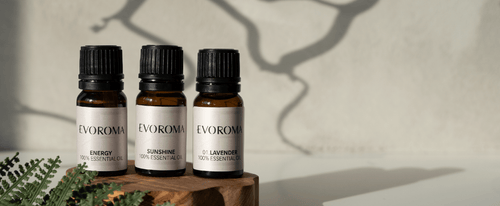
Vad är eteriska oljor?
- Energy. För energi och fokus.
- Calm down. För avslappning och rofylldhet.
- Sunshine. För att lyfta upp humöret när allt känns grått.
- Go to sleep. För att skänka lugn och göra det lättare att somna.
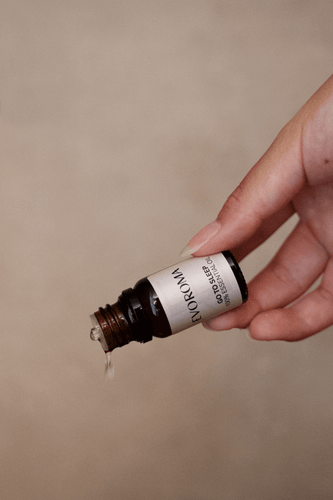
Varför ska man använda eteriska oljor?
- För deras väldoft
- För deras hälsofrämjande egenskaper
- Energy. För energi och fokus.
- Calm down. För avslappning och rofylldhet.
- Sunshine. För att lyfta upp humöret när allt känns grått.
- Go to sleep. För att skänka lugn och göra det lättare att somna.
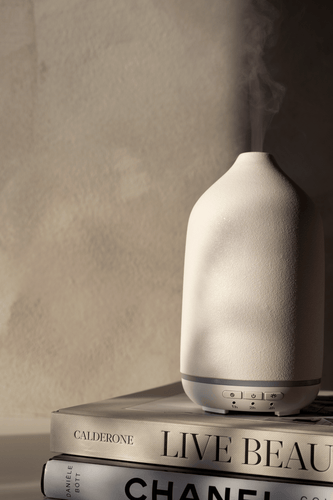
Hur använder man en diffuser?
- Häll i vanligt kranvatten.
- Tillsätt några droppar eterisk olja.
- Starta.
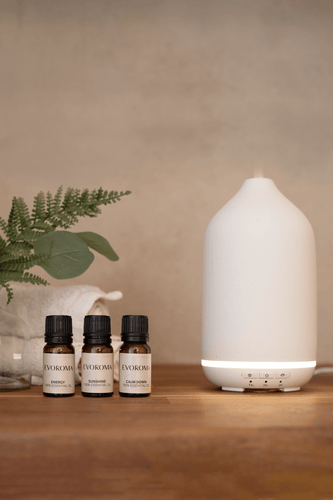
Hur fungerar en diffuser för eteriska oljor?
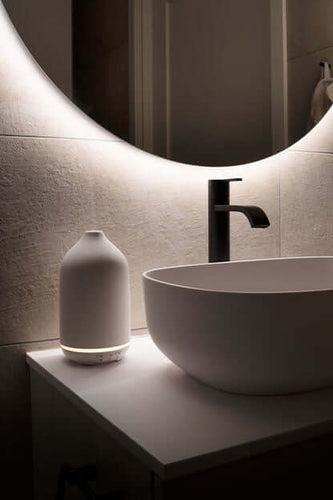
Vad är diffuser för något?
Vilken eterisk olja är bäst?
Vilka eteriska oljor passar bra ihop?
På varje oljas produktsida finns en flik som heter ”Kombinationer”. Där visar vi ett par oljor som vi tycker var för sig rent doftmässigt passar bra ihop med den olja vars sida du besöker. Dessutom ger vi på många produktsidor tips i den löpande texten på specifika blandningar man kan prova.
Utöver det så vill vi här ge ett par tips:
Citrusoljor passar generellt sett bra ihop både med varandra (såsom citron + lime), men är otroligt versatila och kan kombineras med de flesta andra oljor. En väldigt enkel kategori av oljor att kombinera som sällan blir fel!
Skaffa gärna minst en basnot (exempelvis cederträ, patchouli, vetivert, frankincense). De skänker en helt ny tyngd och komplexitet till doftblandningen som du inte riktigt får med de kanske mer välkända oljor som hittas bland topp- och mellannoterna. Exempel på en basnot som älskas av många är frankincense. Den är fantastisk tillsammans med citrus, och passar även med blommiga dofter som lavendel och ylang ylang.
Rosmarin är fräsch, örtig och samtidigt ganska komplex. Den är alldeles lysande tillsammans med citrusdoftande oljor, och vi vill särskilt slå ett slag för rosmarin + citrongräs. Fräsch och behaglig spa-känsla utlovas!
För dig som inte är så bekant med eteriska oljor har vi satt ihop tre olika paket med populära oljor.
Det minsta paketet (3-pack) innehåller oljor som doftar jättegott i sig själva och är bland de allra populäraste.
Mellanpaketet (5-pack) har samma tre oljor som det nyss nämnda, men kompletteras med ylang ylang och frankincense. En populär och blommig mellannot, och en underbar basnot som inbjuder till doftblandningar och skänker karaktär.
Det stora paketet (10-pack) har ett väl avvägt sortiment med populära oljor. Här får du en riktigt fin uppsättning med oljor som kan kombineras på en mängd härliga sätt.
Vilken eterisk olja doftar godast?
Eteriska oljor och husdjur
Det kan även vara bra att tänka på att inte använda för mycket eterisk olja. Som sagt, hundar och katter har bättre luktsinne och känner dofter starkare än vi människor!
Se också till att diffusern inte står placerad precis vid ditt husdjurs sovplats. Doftämnen från den eteriska oljan hamnar i i viss grad runt själva maskinen.
Se också till att ditt husdjur alltid kan ta sig till ett rum där det inte finns någon diffuser som kör, så att de kan gå undan ifall de inte gillar doften.
Bland oljor i Evoromas sortiment bör oregano ej användas om du har hund eller katt. Citrusoljor bör undvikas om du har katt.
Tre oljor som anses helt säkra för både katter och hundar är lavendel, kamomill och frankincense.
Använd aldrig några eteriska oljor direkt på djurets päls.
